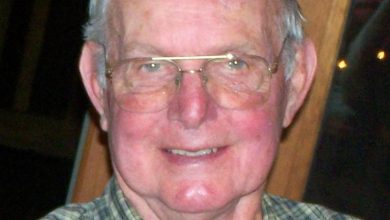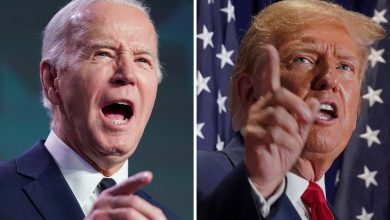Coup de pompe (à chaleur) – POLITICO

— The heat pump sector is coughing, the accounting ministers
— The French executive on the nuclear front in Brussels
— Next offshore wind turbines: end of debates in sight
Hello everyone, It is Monday April 15. I hope you had as good a weekend as the Minister for Energy Roland Lescure, who appeared all smiles on X alongside the Montreal Renaissance activists for his return to his Quebec stronghold.
Unlike parliamentarians, your favorite newsletter doesn’t take vacations. I therefore have the pleasure of taking over from Aude, and will be by your side all week.
COLD SHARP ON THE PAC. It took two ministers to announce boosts for heat pumps, as the sector has recently cooled down. The industry is unscrewing. Sales fell 40% in the first quarter of 2024 compared to last year.
At the bedside of industrialistsBruno Le Maire and Roland Lescure are therefore (very) expected this afternoon in the Somme, on the industrial site of Intuis, one of the major French producers of heat pumps (PAC).
The million! The objective set in September by Emmanuel Macron to “triple the production of heat pumps by 2027”, or one million constructions on French soil, is considered unrealistic by the sector. According to Uniclima, the union of climate engineering manufacturers, the sector will be able to supply around 250,000 heat pumps this year.
The causes of the flu: the real estate crisis, the drop in gas prices, but also the complexity and instability of the MaPrimeRénov system. If the government has once again made “mono-gestures” eligible for MaPrimeRénov aid, that is not enough.
“This simplification has not affected the market, because it stops at the end of the year. It absolutely must be extended,” preaches Arnaud Kautzmann, secretary of the French Association for Heat Pumps, joined by Uniclima on the observation. The sector is also hoping for mechanisms to encourage the purchase of tricolor PACs and training plans to meet workforce needs.
No need for more money, they appreciate. “MaPrimeRénov is so complicated that in 2023 not all the credits have been used,” underlines Camille Beurdeley, general delegate of Uniclima. The key is simplicity.”
At 10:15 a.m.informs meeting of European Energy Ministers in Brussels, where France will be represented by its permanent representative to the EU, Philippe Léglise-Costa
At 2:30 p.m., trip by Bruno Le Maire and Roland Lescure to the Somme dedicated to heat pumps
Senate and National Assembly: Vacation
ATOMIC THRUST. Little by little, the atom builds its nest. Raised as a priority for Emmanuel Macron’s second five-year term, the French revival of nuclear power is trying to impose itself in Brussels, where the government is pushing on all fronts to ensure favorable treatment of atomic energy in European texts .
On the tail side, the executive claims progress in several files over the last 18 months, from the revision of the directive on renewable energies to the reform of the electricity market adopted last Thursday by the European Parliament.
On the face side, the government is trying to unite around it through the creation of the Nuclear Alliance, a club of member countries favorable to the atom which meets regularly on the sidelines of the Energy Council in the European capital.
Match within the match. For once, the French push came up against German reluctance. Berlin, which disconnected its last nuclear reactors last year and whose government opposed the relaunch of nuclear power even at the height of the energy crisis, is also trying to assert its positions via a rival club, the “Friends of Renewables”.
No money, no reactors. All that remains is to find tickets to finance all of this. Especially since the State’s pockets are empty (or even pierced), and the executive is struggling to move forward on the thorny subject of European funding, on which Commission President Ursula von der Leyen has so far focused. . well guarded from adventurers. So, how does France advance its pawns? Helped by our most beautiful rooster emojis (cocorico!), I respond here.
EN WAITING FOR THE ATOM. No nuclear on the menu of the informal meeting of Energy Ministers which opens today in Brussels (without the duo of blue-white-red ministers who – if you followed everything correctly – snubbed the discussions for a in travel to Hauts-de-France).
No Nord Flux 2.0. Today, member countries must discuss possible cooperation between the EU and NATO to protect the continent’s sensitive energy infrastructure from cyberattacks and other acts of sabotage over a working lunch, reports my Brussels colleague Victor Jack.
At the end of the afternoonthey will sign a European solar charter, an agreement which wants to show that the EU cares about the fate of its photovoltaic energy producers, but which is far from meeting the expectations of the sector, subject to fierce Chinese competition.
SOON THE KEEL. Jimmy Pahun is counting the days. This Modem deputy from Morbihan and former skipper knows that he has eleven more left to send his contribution to the public debate on the planning of maritime frontages. With this question, among others: where to put wind turbines?
“For the sake of acceptability”, Pahun – who has already mobilized a lot during the debates for the law to accelerate renewable energies – wants them to be installed “beyond 12 miles when it is technically possible » ». With one detail to settle: currently, beyond 12 miles, all taxes go to the State. For Pahun, this is no longer possible.
The treasure map. Organized by the National Commission for Public Debate (CNDP), these discussions should notably help the government in its future mapping of offshore wind power. In two months, on June 26, conclusions and proposals will be submitted to the executive which will have to answer it. The objective of the energy strategy is to have 18 gigawatts installed by 2035. The State pushed its own cards, to start the debate, at the beginning of March.
Tension. “The opportunity for offshore wind power is debated, that’s for sure,” notes the vice-president of the CNDP, Florent Augagneur, at the helm on the CNDP side. He notes “a tension” in the eco-friendly family between those who want to preserve biodiversity and those who want to install wind turbines to preserve the climate. “It’s a tension that is political, not scientific. The biggest impact on biodiversity is the climate,” he emphasizes.
| CLIMATE NEGOTIATIONS |
THE COP AT THE QUAY. When your newsletter detailed the roadmap of the Minister of Ecological Transition, discerning eyes will have noticed that the monitoring of climate negotiations did not appear there. And for good reason: it is the Quai d’Orsay which has recovered this attribution.
The explanation is twofold. On the one hand, “to push our objectives during bilateral diplomatic exchanges”, recently explained an advisor from the Quai d’Orsay. And on the other hand, “the particular diplomatic issues” linked to the poisonous atmosphere between France and Azerbaijan, where the next COP will be held next fall, adds Christophe Béchu’s office.
Béchu in Ottawa. At the time of the reshuffle, Christophe Béchu’s cabinet had indicated here and there that it was taking over the climate negotiations (without succeeding, therefore). He will be able to comfort himself with other missions of international scope. Its roadmap requires it to have high ambition during the next round of negotiations on plastic pollution, in April in Ottawa, but also at the One Water Summit in September or the European Green Deal.
— 600 students, old students and Polytechnique ask the school to place climate change at the heart of its teachings in a personal letter that Libération was able to consult.
— On the front line of climate change, the city of Nice is trying to adapt. La Tribune Dimanche tells you more.
— Can agrivoltaism solve farmers’ remuneration problems? Not really, because the income they can earn from it is limited, explains L’Express.
A big thank you to our editor Alexandre Léchenet.
Politices





